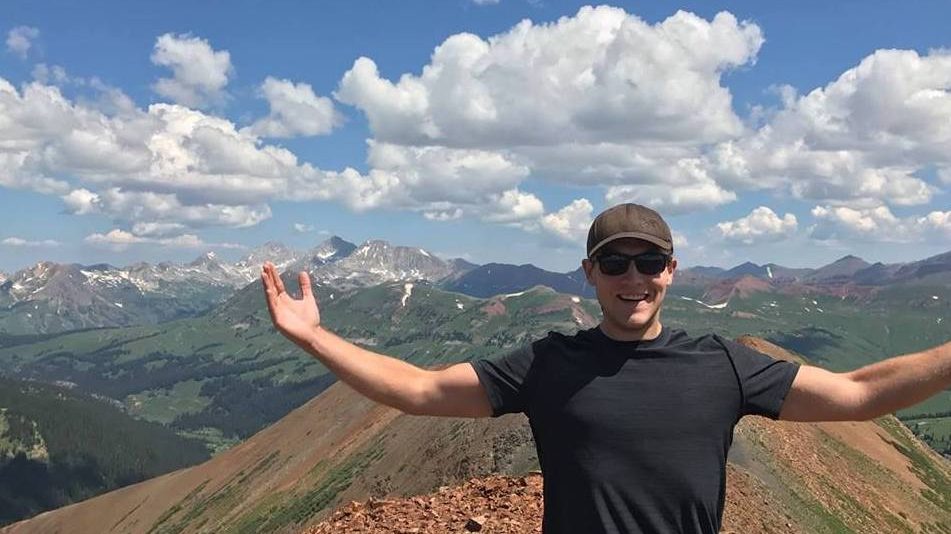Researcher Spotlight – Jared Balik

Spring 2018 Global Change Fellow
PhD Student, Department of Applied Ecology
Advisor: Dr. Brad Taylor
Every year the Southeast Climate Science Center funds a multi-disciplinary cohort of Global Change Fellows representing colleges across NC State University. Here are some highlights about Spring 2018 Fellow, Jared Balik, and the applied research he’s conducting.
About You
What do you study?
My dissertation broadly explores how environmental change affects nutrient cycling in aquatic systems. Most of my research takes place in high elevation ponds, wetlands, and streams. My first and second chapters link climate change to ecological stoichiometry and species interactions in lentic (pond) systems. My third and fourth chapters will link climate change to phenology, primary productivity, and nutrient cycling in lotic (river) systems.
What (or who) influenced you to go into this field of study?
I’ve always loved learning how things work. Family members and friends often tell me I should be an engineer. But beyond mechanical objects and electronics, I’ve always been particularly interested in how nature works. That probably comes from spending my childhood roaming the vast deciduous forest and rolling hills behind my parents’ property in rural Pennsylvania. When I got to college, I realized that I could integrate my fascination with how things work and my love of nature through research in ecology and biogeochemistry. Beyond that, I had a handful of really supportive undergraduate mentors who helped me see how I could transform the pursuit of science into a career.
What do you think is the most pressing issue related to global change?
Animals and plants often have functional roles in their environments. Plenty of research has identified systems where climate change is prompting species to adjust their ranges and spatial distributions. Plenty of research has also identified species that are in decline due to climate change. I think it would be awesome if we spent more time exploring the functional consequences of these changes in species distributions or species losses/gains. I think that stories about what happens when Species X goes locally extinct are very successful at motivating conservation.
What is your dream job?
I want to teach at a small university or liberal arts school. My undergrad mentors are among the most important and influential people in my life – so I really would like to pay it forward by establishing my own undergraduate-focused research program. Beyond that, I also want to have a happy Labrador, a nice garden, and a garage within which I can tinker and build whatever I want.
You can see Jared Balik’s Global Change Fellows profile here.
About Your Research
What is the most important thing that you’ve learned?
The most exciting thing I’ve learned so far is that even closely related invertebrates excrete (pee) very different amounts of nutrients back into the water column. And we don’t completely understand why. But, in one of my study systems, some closely related invertebrates with very different nutrient excretion rates are replacing each other due to climate-driven distributional shifts. They are the biomass-dominant animals in the ponds that they live in – thus, these species replacements could have big implications for nutrient cycling.
How can your research be used to inform management decisions?
While often taken for granted, the economic costs or benefits of nutrient cycling are readily quantifiable by comparison to costs of management practices for adjusting nutrient levels to meet EPA standards. So, understanding how climate or other environmental change can modify nutrient cycling through biotic or abiotic pathways is important for setting resource management and conservation goals.
How would you describe your research to a 3rd grader?
I study the chemical building blocks of life, and I watch them move between animals and the ponds or streams they live in.
About Your Global Change Fellow Experience
How do you expect the SE CSC Global Change Fellows Program to impact you and your work?
I was excited about the Fellows program because it presented an opportunity for exposure to diverse and interdisciplinary climate problems, goals, and technologies in the southeast. My climate expertise lies in montane systems, and thus, I could learn about coastal and inland systems and share my specialized knowledge with other fellows. Further, I feel that the science communication training offered by the SE CSC will further equip me to disseminate my climate research outside of academia.
- Categories: